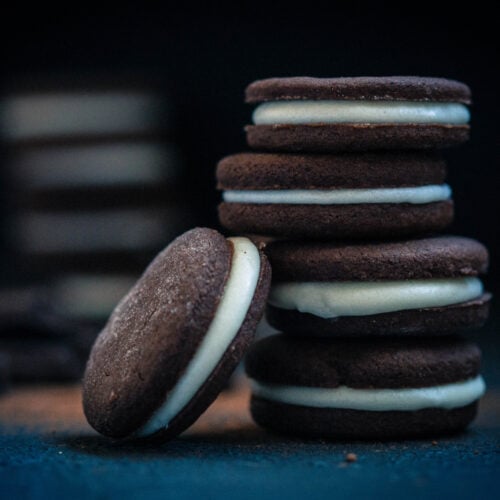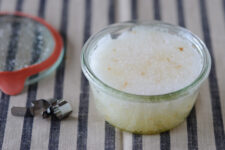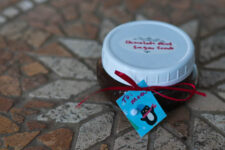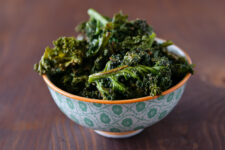Did you hear the news? Oreos are just as addictive as cocaine!
I was kind of shocked to find that out, actually, because it’s not at all my experience with Oreos. I generally feel more of a heroin-like effect when I eat them. Oh, wait…that’s probably because sugar is similar to heroin to the body. Yeah, it all makes sense now.
Ok, friends, I hope you know I am totally joking here. I have zero experience with either cocaine or heroin (and I haven’t had more than a handful of store-bought Oreos in many years). I’m going to share a recipe for Homemade Oreos with you in this post, but first I have some other things to say.
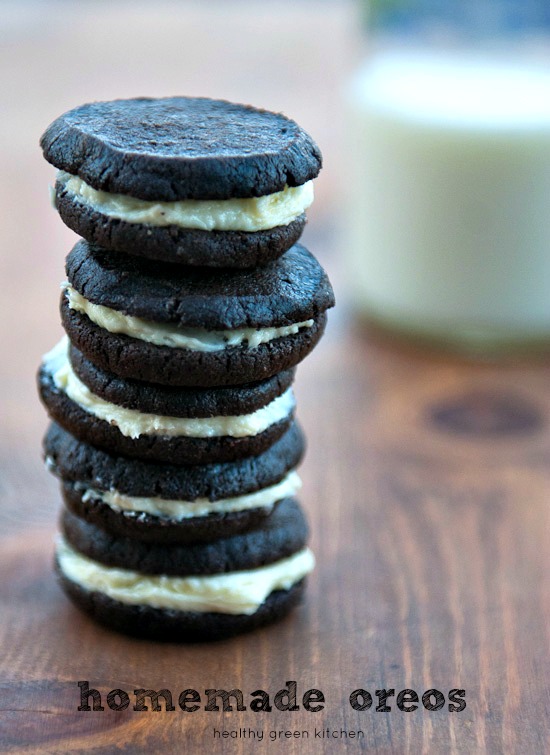
I’m getting really tired of all of these “this food is the equivalent of a street drug” references out there (I mean…seriously? Can we stop with this already? It’s just wrong on so many levels). I’m sick of all of the articles that scare people into thinking they are poisoning themselves if they consume cookies or anything else containing sugar, too, without any mention of context or dose.
I’ve never been anything but completely honest with you, my readers, so I have no problem telling you that I used to believe all that sugar is toxic/addictive/what have you stuff. That’s right, I did. Those of you who have been reading my blog for a while may recall that I’ve even written statements like that in the past. I am being very upfront about this right now because I’ve changed my mind about it being helpful (or true) to refer to sugar that way. Well-designed scientific studies have not proven that sugar is either toxic or addictive when consumed in reasonable amounts by healthy individuals so I’m no longer going to use terminology that suggests it is.
Below are some quotes folks left on my Facebook page just the other day:
- “Addictions are all the same! They control your life and often ruin it! Sugar is an addiction!”
- “Proven fact sugar addiction is as tough as heroin”
- “This whole country is addicted because our food manufactures add sugar to everything”
- “People can become addicted to simple carbs just as they can to smoking or alcohol”
I did not make those up: they are real comments left by real people when I recently challenged the concept that sugar is as addictive as drugs. The people who left these comments were rude and argumentative when I asked them to back up their claims with scientific evidence. They claimed I was in “sugar denial” for not agreeing with them.
My intention here is not to call people out for being ignorant…it’s to draw attention to how damaging it can be to not have correct information…to be trapped in dogma that’s not evidence-based.
In the sugar = heroin article I linked to at the top of this post, a certain doctor asserts that “when you eat sugar, it stimulates the release of dopamine into the nucleus accumbens, which makes you feel pleasure. The brain recognizes and likes this feeling and begins to crave more. It may startle you to learn that heroin, morphine, and sugar all stimulate the same receptors in your brain.”
This is quite a provocative statement, yes? It’s worded in such a way that you are very likely to come away from the article feeling:
a. guilty for enjoying sugar because enjoying sugar is just like enjoying drugs
b. convinced that you need a detox to heal yourself from sugar’s addictive grasp.
Guess what? Playing with kittens stimulates the pleasure centers in your brain, too, but I don’t see anyone recommending a detox for that. Just because you enjoy something does not mean it’s terrible for you, you have to feel guilty about it, and stop doing it altogether (not talking about doing drugs here, folks).
I have taken some flack as of late for not being willing to demonize sugar. For questioning the existence of sugar addiction. I really don’t care: I’ve hopped off the “sugar is ruining your health” bandwagon because there’s just no credible science to show that sugar abstinence is healthier than a diet that stresses balance and eating sugar in moderation. (For the record, I’ve always been a cheerleader for moderation…this is nothing new.) In fact, I think obsessing over this one thing, and running around screaming “SUGAR IS THE WHITE DEVIL,” is not really helping people figure out out how to live full, happy, healthy lives.
Do I believe eating lots of sugar fosters optimal health? No, of course not. I know full well that when sugar is consumed in large amounts, it’s likely to cause health problems. I personally ran into health problems in the past when I ate too much sugar. There are certainly reasons to watch the amount of sugar you eat (I do).
But am I concerned that a small amount of sugar will harm me? Poison me? No, I am not concerned. Not even a little bit. I enjoy treats made with sugar (like ice cream, cake, and cookies…mostly homemade, but sometimes not) and I don’t think they’re “bad” for me. Not in the least. They are a small part of my health-promoting, real-food diet and I enjoy the heck out of them.
Listen up: it’s more than fine to be concerned about food quality and nutrient density. I am obviously concerned about these: those concerns are at the heart of this website. But being concerned about those things does not mean one can simply ignore the realities of biology. The fact is that your body thinks sugar is sugar. I don’t really use much white sugar (and I do recommend against its use in my book); I choose organic sugar most of the time because it’s produced sustainably, it’s free of GMOs and pesticides, and because I believe buying fair trade is important, and I use many other unrefined sweeteners.
Organic sugar, however, is not metabolized by my body in a measurably different way than white sugar. Raw honey? It’s lovely and I adore it. But again, it’s the same as sugar once it gets into my body. Maple syrup? It’s delightful and I couldn’t live without it, but my body doesn’t give a hoot how much I paid for it…my body still thinks it’s sugar. Coconut sugar? Sugar. Fruit? Sugar. I could go on and on.
There are absolutely valid reasons to choose unrefined sweeteners and fruit over white sugar, such as concern for source, processing, nutrient value, and the environment. But it’s not necessarily correct to say your body metabolizes one type of sugar in a vastly different way than another. (I’m not talking about high fructose corn syrup here, folks, because it does appear to be metabolized differently.)
All sugars, and all starches, are carbohydrates. All carbohydrates break down in the body into sugar. This does not make all carbohydrates bad for you…far from it. If you don’t eat enough carbohydrates, you can damage your metabolism.
It’s really hard to know what to believe these days, isn’t it? Maybe you saw a documentary or read a book or news story in a major magazine and the message you took away was that sugar is addictive and toxic and it scared the heck out of you…gave you the impression that sugar is to blame for every health problem that exists in the world…made you think you should never eat sugar again.
It’s a real problem, though, when your body seems to want sugar while your mind is telling you not to have it. This can do a real number on you…it can make you think there’s something wrong with you…it may “confirm” your fears that you do indeed are addicted to sugar.
Guess what? There is nothing wrong with you if you like sugar. Want sugar. Crave sugar. This is normal. It does not mean you have an addiction and that you need a detox. We evolved to want and need sugar. You heard me right: your body needs sugar. Once you have a clear understanding of this fact, you can move beyond the hyperbolic nonsense (because that is what much of the anti-sugar propaganda is) and give your body what it wants when it wants it. You can eat sugar without fear, even refined sugar if you want to eat it sometimes.
I am open to the fact that you may have experimented with some form of sugar abstinence and that you have found you feel better without it (whatever “it” may be…all white sugar? all types of sugar besides fruit? all types of sugar designated bad by a diet guru?). Fine! Then don’t eat it. No skin off my back. But please don’t go out and tell everyone else, including me, that we’re sugar addicts and we’d all be better off giving it up, as well.
If you haven’t given up sugar, but you’ve been struggling with your perceived terrible relationship with sugar, if you are convinced you you are addicted to sugar, I want you to know something. I too once thought I had a real problem with sugar. I craved it constantly. I overate sweet things every time I took one bite. I thought I was addicted to sugar.
But then I radically overhauled my diet. I learned I wasn’t eating enough food overall. I dealt with my food sensitivities. I “discovered” real food and completely changed everything about how I ate. I figured out that I do best when I have protein at every meal. I incorporated high-quality fats into my eating strategy and figured out how many carbs I do best with, and what kind. It’s been twenty years that I’ve been at this, and I am still making changes now and then. My diet now includes some sugar (generally unrefined sugar, but occasionally white sugar). When I want something sweet, I eat it. End of story.
Before you banish sugar from your life, please take the following into consideration:
- Are you eating enough food? As in enough calories to support your activity level? When you consistently undereat, it’s very common to crave sugar.
- Do you eat breakfast and other meals at regular-timed intervals throughout the day? If you don’t, your blood sugar is prone to swings and this may make you crave sugar.
- Are you eating enough protein? As in protein at every meal and snack? When you don’t eat enough protein, it’s very common to crave sugar.
- Are you eating enough healthy fats? Diets too low in high-quality fats can lead to sugar cravings, too.
- Might you have food sensitivities? When I had them, I had crazy cravings for sugar. Once I sorted them out: no more sugar cravings.
- Is it possible your body is out of balance in some way? Is something hormonal or metabolic going on? Vague, I know, but entirely plausible. Sorry for not being more specific but this is a blog and I am not a practicing physician.
- Do you get enough sleep? This one is so common…many people don’t…often leads to an increase in sugar cravings.
- Do you have a lot of stress in your life? Again, so common. More sugar cravings.
- Have you considered that your dependence on sugar is psychological? It’s very possible…this is different than an addiction. Have you tried removing the “bad” label you’ve given to sugar? Sometimes when we make things off limits we want them more than when we allow ourselves to eat them when we want them without any “judgment.”
- Is it possible you overeat sugar because you have a binge eating disorder? Please, please, please talk to a professional about this.
Again, I want to be really clear that the point of this post is not to make a case for eating lots of sugar. It’s about making a case for consuming sugar in moderation. I repeat: I am not giving you the go-ahead to eat a whole bag of store-bought Oreos nor am I telling you to eat the whole batch of my homemade version. That’s not moderation. Moderation isn’t about living your life in a constant state of swinging from one extreme to the other. Moderation is the opposite of extremes. It’s not eating a whole bag of something and then spending a week on a “cleanse.” It’s about finding balance…a place in the middle that works for you on a consistent basis.
Every single time I mention moderation in the context of eating sugar (both online and in my real life), someone tells me “that doesn’t work.” I vehemently beg to differ. Moderation may not be sexy enough to get someone on the bestseller’s list, but there’s plenty of scientific evidence that it does indeed work. Can you “do” moderation overnight if you’re more accustomed to swinging from one extreme to another? No, probably not. It may take some time, and you’ll have to put in some work. but I believe the payoff for doing that work is big.
Before I get to the Homemade Oreo recipe, I am quite sure some of you are currently thinking something along the lines of:
“But Winnie! Sugar causes type 2 diabetes! Why are you telling people it’s ok to eat sugar?
or
“But Winnie! Sugar causes obesity! Why are you telling people it’s ok to eat sugar?
To the first point: Sugar does not cause diabetes. Saying so is a vast oversimplification of the situation. Type 2 diabetes is a metabolic disorder. Over consumption of sugar may play a role in the development of type 2 diabetes, but it is not the cause. Want to prevent and/or treat insulin resistance? Exercise. It’s pretty much the best thing you can do to improve insulin sensitivity.
To the second point: Sugar does not cause obesity. No one thing causes obesity. Not sugar (nor high fructose corn syrup)…not carbs…not GMOs…not food from fast-food restaurants. Over consumption of sugar may contribute to obesity but sugar is not the cause. I hope to address weight in a future post or posts…this one’s already way too long to dive into that issue.
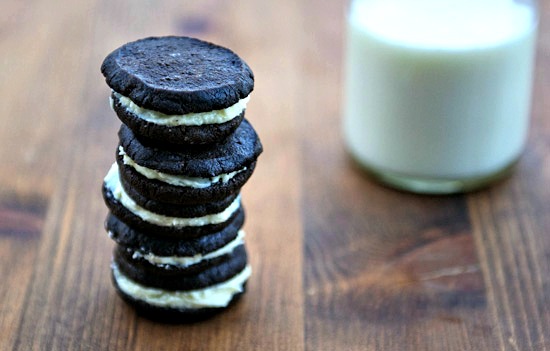
Many thanks to my friend Kaela of Local Kitchen for sharing her science-minded perspective on this issue with me over a long and quite enjoyable phone call.
Related Articles For Your Reading Pleasure:
No, Oreos Aren’t As Addictive as Cocaine by Jason Koebler
The Bitter Truth About Fructose Alarmism by Alan Aragon
Good Insulin, Bad Insulin : Its Role In Obesity? by David Despain
Your Problem with Sugar is The Problem with Sugar by Joy Victoria
Sugar Addiction by Go Kaleo
Sugar Addiction Part 3 by Antonio Valladares
Diabetes, Dangerous Fat, and Protective Sugar by Andrew Kim
The Balance of Moderation by Alta at Forgiving Perfection
Sugar On Trial: What You Really Need to Know at New Scientist
No, Your Favorite Food is Not Like Crack by L.V. Anderson
Homemade Oreos
Ingredients
For the oreo cookies:
For the oreo filling:
- 1/2 cup salted butter softened, preferably organic
- 1 2/3 cup powdered sugar preferably organic
- 1 tbsp heavy cream raw and organic if possible
Instructions
- Cream butter with sugar in the bowl of an electric mixer until smooth. Add egg yolk and mix thoroughly.
- Whisk flour together with cocoa powder in a medium bowl, then add to the butter/sugar/egg yolk mixture. Beat on low speed until combined. Add the melted chocolate and mix on low until the dough comes together. The dough will be quite soft at this point, and that’s fine.
- Form dough into a log (about 12 inches long) and wrap in parchment paper. Refrigerate overnight, or at least for a few hours.
- Heat oven to 325 degrees F. and line 2 cookie sheets with parchment paper. Remove dough from refrigerator and allow to stand for about 5 minutes while you prepare the icing by beating the softened butter with the powdered sugar and cream in the bowl of an electric mixer.
- Using a sharp knife, cut dough into thin slices (about ¼ inch). You should have about 40 cookies. Place them on parchment-lined baking sheets and transfer to the oven.
- Bake the cookies for 16-18 minutes, or until they are firm to the touch (the thicker you slice them, the longer they will take to bake).
- Allow cookies to rest on the baking sheet for a couple of minutes before transferring them to a wire rack and allowing them to cool completely.
- When cool, spread about one tablespoon of the icing onto the bottom of one cookie. Top with a second cookie. Repeat until all of the cookies are filled.

